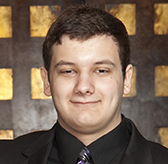 Philip received $1,000 from FFRF for his winning essay.
Philip received $1,000 from FFRF for his winning essay.
By Philip Kaltman
Since I was a small child, religion was a large part of my life. I attended Sunday school and Hebrew school regularly. I went to Friday night services often, and I trusted that God had a plan and was everywhere.
I have lived in the bible belt my entire life, surrounded by both Judaism and Christianity, but natural science also played a large role in my childhood. Instead of playing baseball, I stood in the outfield watching insects in the grass. Before I could read, I could tell you which dinosaur a skull or tailbone belonged to. I watched “Land Before Time” cartoons and paleontology documentaries. Dinosaurs were my life.
So when my Sunday school teacher explained that Noah put two of every animal on his ark so they would survive, my 7-year-old brain was confused. Where were the dinosaurs? Why weren’t they on the ark? Obviously, they existed once, or we wouldn’t have their bones.
I got the classic answer, “Because Noah didn’t take them.” Who was this Noah, and why did he decide to deprive me of dinosaurs?
Later, a documentary showed me that dinosaurs’ extinction was due to a massive meteor impact, an answer that made sense. It wasn’t some old man’s capricious decision, it was a natural occurrence.
That was my first seed of doubt. My synagogue was no longer infallible. It was contradicted by smart scientists.
When I was stung by a bee several years later, it hurt horribly. My parents said the bee was trying to protect itself. So I asked, “Why did it need to protect itself? Didn’t God control everything? Wouldn’t he protect the bee and me equally?”
Then I learned about the theory of evolution, which led me to understand why animals that could hurt us existed, and to see that perhaps God didn’t control the bee and wouldn’t protect it and me. This was my first real crisis of faith. Did God exist at all?
The more I learned, the more I doubted, until in 10th grade, I declared in front of my entire synagogue that I did not believe in God. There were gasps, stares and weird looks, but I persevered. After the service, astoundingly, many people congratulated me on my speech and my willingness to share my lack of belief.
I learned that defending my freethought was not something to be nervous about, but instead could be accepted as a good thing. So I tried it more, this time at school.
Despite how secular we want our public schools to be, religion in many places permeates almost every aspect of them. I had to awkwardly explain to my football coach that I didn’t know the Lord’s Prayer. I repeatedly turned down the friend who invited me to his Fellowship of Christian Athletes prayer sessions.
To overcome this, I helped found my school’s first freethinker’s club, after jumping through myriad hoops and finding ways around constantly being told we couldn’t. We provided a safe haven for others who challenged the faith that is so deeply ingrained in our culture.
Recently, I attended a planning meeting for my Cobb County School District, where a woman demanded that creationist alternatives to evolution be taught in science classrooms. (Cobb County in Georgia became notorious about 10 years ago for putting labels on science textbooks that said “Evolution is a theory, not a fact.”)
I was quick to jump in and oppose her. I explained that I had interned in an evolutionary biology lab at Emory University and had seen evolution happen in front of my eyes.
The meeting’s leaders gave every attendee a sticker to put next to the viewpoint that they supported. I felt extremely proud as I counted line after line of stickers next to my suggestion that only evolution should be taught in schools, versus the single sticker next to my opponent’s.
Philip Kaltman, 17, Marietta, Ga., will attend the Georgia Institute of Technology and major in biology. He interned in an Emory University microbiology lab, researching evolutionary and genetic biology. He was an officer of the Science Honor Society and an officer of the Freethinker’s club at his magnet STEM high school.

